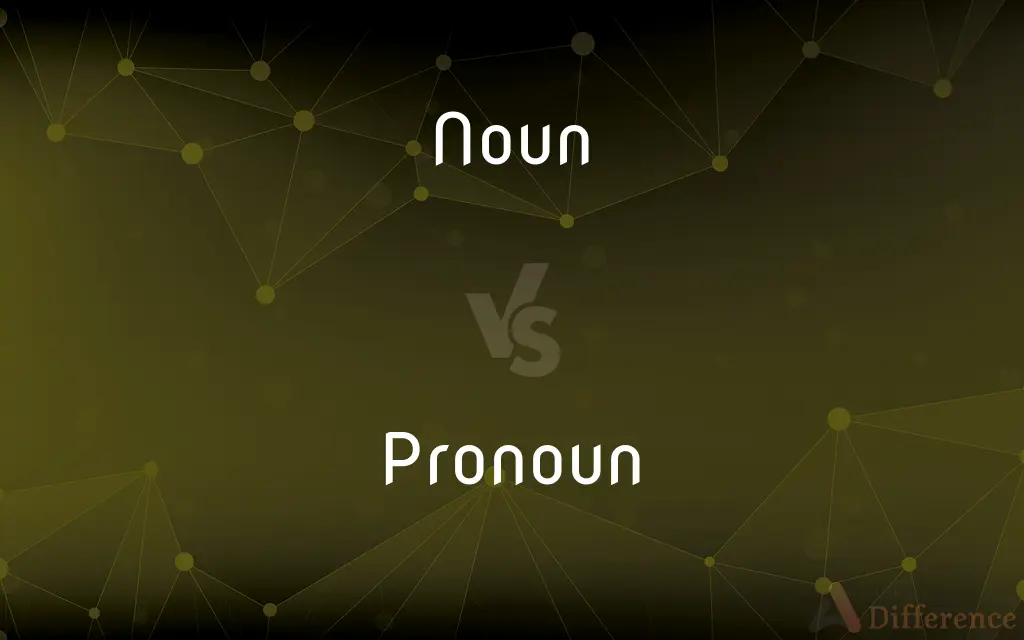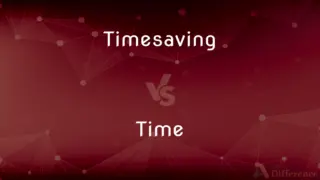Noun vs. Pronoun — What's the Difference?
Edited by Tayyaba Rehman — By Fiza Rafique — Updated on September 21, 2023
A noun is a word that represents a person, place, thing, or idea. A pronoun is a word that replaces a noun in a sentence to avoid repetition.

Difference Between Noun and Pronoun
Table of Contents
ADVERTISEMENT
Key Differences
A noun and a pronoun are both essential elements of English grammar but serve different functions. A noun identifies people, places, things, or ideas, providing the essential "who" or "what" in a sentence. In contrast, a pronoun stands in for a noun, often to avoid repetition or provide clarity.
The versatility of nouns is evident in their many forms: proper nouns (like "Sarah" or "Paris"), common nouns ("dog" or "city"), and even abstract nouns ("love" or "freedom"). Pronouns, however, are more limited in variety. They include personal pronouns like "he" and "she," possessive pronouns like "his" and "hers," and reflexive pronouns like "himself" and "herself."
Nouns generally require an article ("a," "an," or "the") or another determiner ("some," "few," etc.) when they are the subject or object of a sentence. Pronouns usually don't require such determiners because they are inherently more specific, often having been introduced or implied earlier in the text.
In terms of grammatical agreement, both nouns and pronouns need to match in number and sometimes gender with the verbs and adjectives around them. For example, in the sentence "She runs," both the pronoun "she" and the verb "runs" are singular. This kind of agreement is crucial for maintaining clarity and coherence in language.
Comparison Chart
Function
Identifies
Replaces
ADVERTISEMENT
Variety
Many types
Limited types
Requires Article
Usually
Rarely
Number Agreement
Required
Required
Gender Agreement
Sometimes
Often
Compare with Definitions
Noun
Nouns can also represent abstract ideas or concepts.
Love is a powerful emotion.
Pronoun
A pronoun is a word that replaces a noun in a sentence.
He is running.
Noun
Nouns can be proper, common, countable, or uncountable.
Water is essential for life.
Pronoun
Pronouns can be personal, reflexive, or demonstrative.
This is mine.
Noun
A noun is a word that identifies a person, place, or thing.
The dog chased the ball.
Pronoun
Pronouns help to avoid repetition in speech and writing.
She ate her lunch because she was hungry.
Noun
A noun serves as the subject or object in a sentence.
The book is on the table.
Pronoun
Pronouns must agree in number and gender with the nouns they replace.
They love their pets.
Noun
A word (other than a pronoun) used to identify any of a class of people, places, or things (common noun), or to name a particular one of these (proper noun).
Pronoun
Pronouns can be subject, object, or possessive.
Yours is over there.
Noun
A noun (from Latin nōmen 'name') is a word that functions as the name of a specific object or set of objects, such as living creatures, places, actions, qualities, states of existence, or ideas. However, noun is not a semantic category, so it cannot be characterized in terms of its meaning.
Pronoun
In linguistics and grammar, a pronoun (abbreviated PRO) is a word that substitutes for a noun or noun phrase. Pronouns have traditionally been regarded as one of the parts of speech, but some modern theorists would not consider them to form a single class, in view of the variety of functions they perform cross-linguistically.
Noun
The part of speech that is used to name a person, place, thing, quality, or action and can function as the subject or object of a verb, the object of a preposition, or an appositive.
Pronoun
A word that can function as a noun phrase used by itself and that refers either to the participants in the discourse (e.g. I, you) or to someone or something mentioned elsewhere in the discourse (e.g. she, it, this).
Noun
Any of the words belonging to this part of speech, such as neighbor, window, happiness, or negotiation.
Pronoun
The part of speech that substitutes for nouns or noun phrases and designates persons or things asked for, previously specified, or understood from the context.
Noun
A word that functions as the name of a specific object or set of objects, such as person, animal, place, thing, phenomenon, substance, quality, or idea; one of the basic parts of speech in many languages, including English.
Pronoun
Any of the words within this part of speech, such as he or whom.
Noun
Either a word that can be used to refer to a person, animal, place, thing, phenomenon, substance, quality or idea, or a word that modifies or describes a previous word or its referent; a substantive or adjective, sometimes also including other parts of speech such as numeral or pronoun.
Pronoun
(grammar) A type of word that refers anaphorically to a noun or noun phrase, but which cannot ordinarily be preceded by a determiner and rarely takes an attributive adjective.
Noun
(computing) An object within a user interface to which a certain action or transformation (i.e., verb) is applied.
Pronoun
Any of the pronouns by which a person prefers to be described, typically reflecting gender identity.
My pronouns are she/her.
Noun
(transitive) To convert a word to a noun.
Pronoun
A word used instead of a noun or name, to avoid the repetition of it. The personal pronouns in English are I, thou or you, he, she, it, we, ye, and they.
Noun
A word used as the designation or appellation of a creature or thing, existing in fact or in thought; a substantive.
Pronoun
A function word that is used in place of a noun or noun phrase
Noun
A word that can be used to refer to a person or place or thing
Noun
A word that can serve as the subject or object of a verb
Noun
A noun can be singular or plural.
The cars are parked outside.
Common Curiosities
Can a noun be an abstract concept?
Yes, nouns can represent abstract ideas like love or freedom.
Can a pronoun stand for an abstract noun?
Yes, a pronoun can replace an abstract noun as long as it is clear what it refers to.
Do nouns and pronouns need to agree in number?
Yes, both must match in number with the verbs and adjectives around them.
What is a pronoun?
A pronoun is a word that replaces a noun in a sentence.
What types of nouns are there?
Nouns can be proper, common, countable, or uncountable.
What types of pronouns are there?
Pronouns can be personal, possessive, reflexive, demonstrative, and more.
Do nouns require an article?
Generally, yes—especially when they are the subject or object in a sentence.
Can a noun become a pronoun?
Not exactly, but a pronoun can replace a noun in a sentence.
Can pronouns be plural?
Yes, pronouns like "they" or "we" are plural.
What is a noun?
A noun is a word that identifies a person, place, thing, or idea.
What's a possessive noun?
A possessive noun shows ownership, like "John's car."
Is "it" a noun or a pronoun?
"It" is a pronoun that can replace a noun referring to an object, animal, or idea.
Do pronouns require an article?
Usually not, as they are inherently more specific.
How do I know which pronoun to use?
The choice depends on number, gender, and function in the sentence.
What's a possessive pronoun?
A possessive pronoun, like "his" or "hers," indicates ownership.
Share Your Discovery

Previous Comparison
Launch vs. Lunch
Next Comparison
Timesaving vs. TimeAuthor Spotlight
Written by
Fiza RafiqueFiza Rafique is a skilled content writer at AskDifference.com, where she meticulously refines and enhances written pieces. Drawing from her vast editorial expertise, Fiza ensures clarity, accuracy, and precision in every article. Passionate about language, she continually seeks to elevate the quality of content for readers worldwide.
Edited by
Tayyaba RehmanTayyaba Rehman is a distinguished writer, currently serving as a primary contributor to askdifference.com. As a researcher in semantics and etymology, Tayyaba's passion for the complexity of languages and their distinctions has found a perfect home on the platform. Tayyaba delves into the intricacies of language, distinguishing between commonly confused words and phrases, thereby providing clarity for readers worldwide.















































